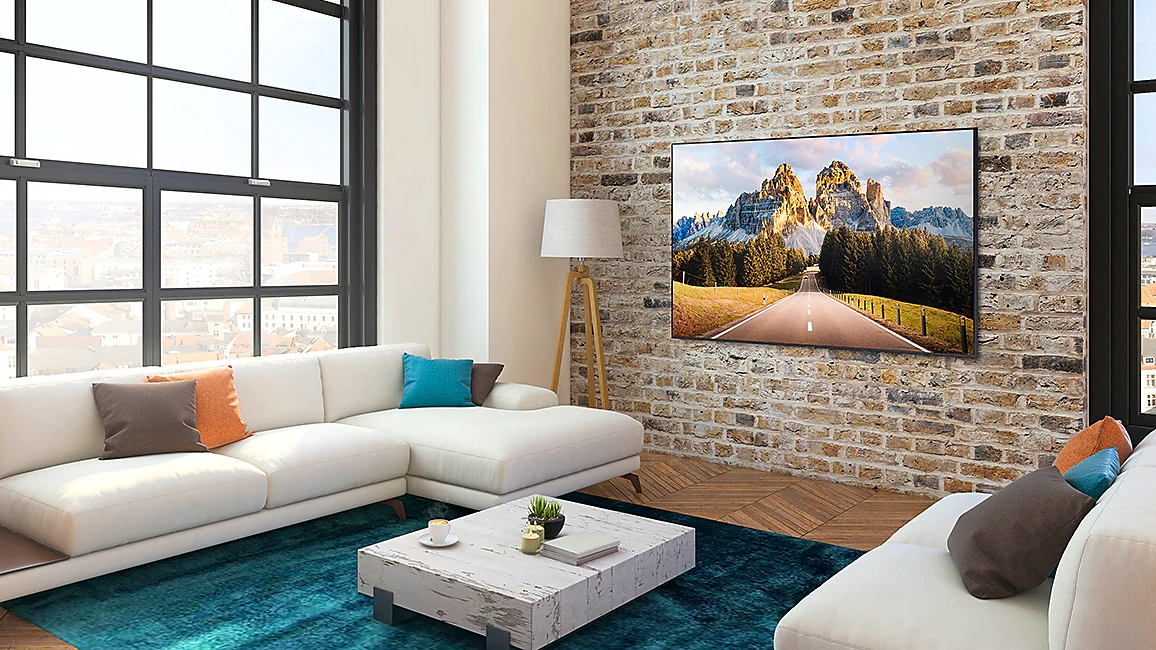TechRadar Verdict
The Samsung AU7100 Series makes some minor concessions in the upscaling and sound performance departments, but otherwise this budget 4K TV has one of the best price-to-performance ratios out there.
Pros
- +
Very decent 4K picture quality
- +
Exemplary smart TV interface
- +
Numerous control options
Cons
- -
Can struggle with upscaling
- -
No Dolby Vision HDR
- -
Sound is a bit of an afterthought
Why you can trust TechRadar
One-minute review
The Samsung AU7100 is built for a world where flagship TVs with eye-popping specs are all well and good, but what we really want is an affordable TV at a screen-size that suits us, and that gets on with the basics of Being A Television in a way that’s impressive.
The list of positives is extensive here, and it runs from build quality and design, through ergonomics and smart TV, all the way to 4K picture quality. In every respect, the AU7100 absolutely nails those requirements in a way that makes the asking price seem rather generous. Obviously, at this price the image quality isn't a match for what the best TVs overall can offer – but compared to the best TVs under £500, you won't find such consistent quality at such big screen sizes from anything else.
And where it’s less impressive – with sound quality and its ability (or otherwise) to upscale older content, mostly – well, it’s no worse than some alternative designs that cost quite a bit more money.
As long as you know the size of screen you require, and you’ve set a budget that’s modest but not unrealistically so, Samsung will sell you an AU7100 that will keep you satisfied for quite a few years.
Price and availability
The Samsung AU7100 is on sale now in the UK – with the AU7000 being the closest US equivalent.
The 43-inch variant we’re testing here costs £449, though it’s available in numerous screen sizes: a 50-inch version costs £549, and there’s also 55-inch (£599), 58-inch (£TBC), 65-inch (£799), 70-inch (£899), 75-inch (£999 ordinarily, although at the time of writing it’s available fro Samsung UK with £100 off that price), and a whopping 85in model (£1,799).
So if you can’t find an appropriately sized AU7100 in that line-up, the fundamental problem lies with you rather than with Samsung.
It’s not uncommon for Samsung to develop specific model variants for specific territories, and that seems to be the case here. Although there are Samsung models for both the American and Australian market that appear pretty similar to the AU7100, they’re not exactly the same. Having said that, though, the very least American or Australian customers can expect from the AU7100-ish model available to them is that it will be extremely competitively priced.

Design
- Remarkably slim bezel
- Feet are quite wide apart
- 6cm deep
Even the most expensive TVs tend to play it safe design-wise, so no one should really be expecting any out-there design flourishes where a mainstream model like the AU7100 is concerned. And sure enough, there aren’t any - which is undoubtedly a good thing.
It’s a discreet looker, the AU7100, with next-to-no bezel around the top and sides of the screen. The bezel across the bottom, which carries a little central ‘Samsung’ logo, isn’t much bigger. And if you’re not wall-mounting your AU7100, its simple plastic push-and-click boomerang feet continue the minimalist vibe. Mind you, they’re quite far apart - so even a screen as relatively titchy as the 43-inch model we’re testing here needs a reasonably wide surface to stand on.
As you might expect with a TV designed to hit a pretty small performance/price sweet spot, the Samsung is adequately rather than lavishly specified. Three HDMI inputs (all of which offer the Auto Low Latency Mode aspect of the HDMI 2.1 specification), a USB input, Ethernet socket, an RF aerial binding post and a CI slot account for physical inputs, while integrated Wi-Fi and Bluetooth 4.2 take care of wireless connectivity. There’s a digital optical output for legacy soundbars, and one of the HDMI sockets is eARC-enabled for a more modern equivalent.
The AU7100 is part of Samsung’s Crystal UHD range of screens, and as such it’s a 4K LCD/LED device with backlighting arranged around the edges of the screen. Picture quality is governed by the company’s Crystal Processor 4K processing engine. As far as HDR goes, well, it’s Samsung business as usual - which means HLG, HDR10 and HDR10+ dynamic metadata, but not a sniff of Dolby Vision. Samsung has managed to include ‘Filmmaker Mode’ as one of the AU7100’s picture presets and the warning that flashes up regarding increased power consumption should this mode be selected never fails to amuse, given how dim the resulting images are.
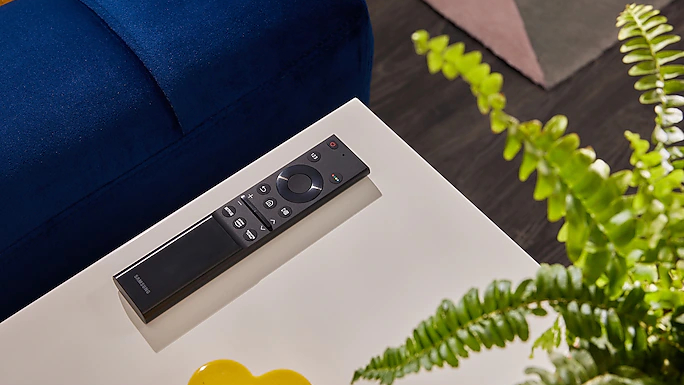
Smart TV (Tizen)
- Ships with two remote controls
- Excellent Tizen-based interface
- Voice-control possibilities
The Tizen-based smart TV interface Samsung has been persisting with for the last however many years is so intrinsically correct that it only needs the most minor refreshes to keep it competitive. So while the AU7100 isn’t the only affordable little TV to be equipped with an easy-to-use and comprehensive smart TV portal, it’s nevertheless one of the very best around.
As has lately been Samsung’s wont, the AU7100 is supplied with a couple of remote control handsets with which to navigate the interface, pursue the set-up menus and what-have-you. One is (and there’s no two ways about it) an unpleasant, cheap-feeling, overburdened handset of confusion, while the is a much nicer, much more minimal ‘just the basics’ alternative.
There’s no integrated voice control here, but if your Samsung is on a common network it can be controlled using either an Amazon Alexa or Google Assistant smart speaker. Or there’s Samsung’s proprietary Smart Things control app, which is as stable and useful here as it is for every other Samsung TV.
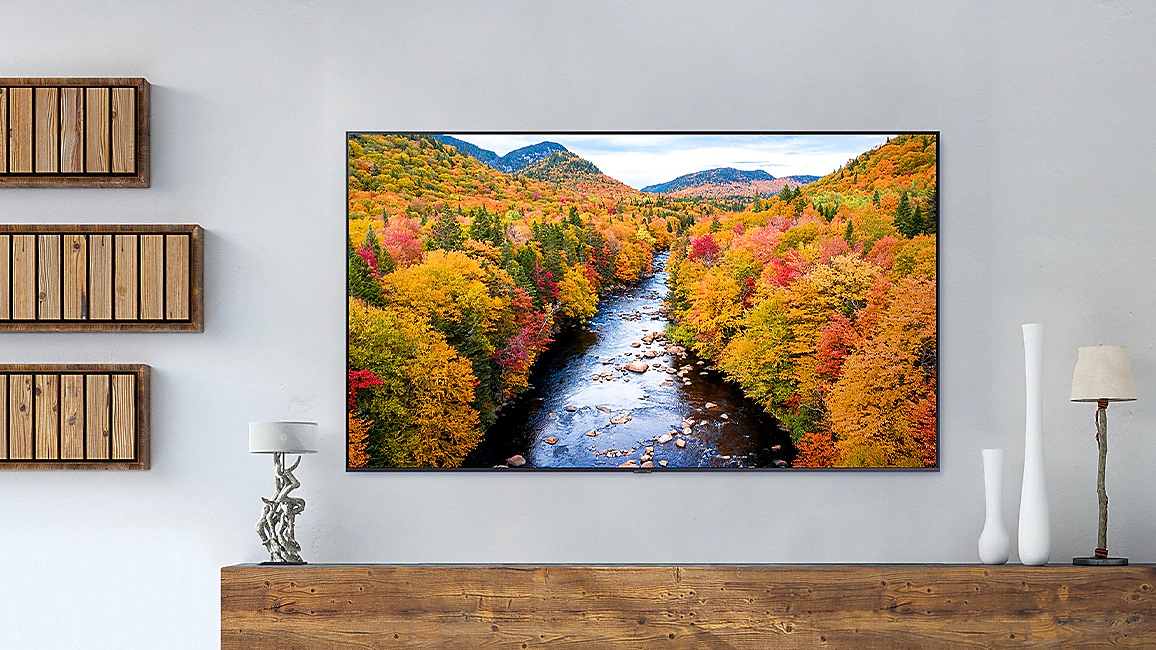
Picture performance
- Enjoyable and convincing 4K images
- Far from the worst gaming monitor around
- Can make upscaling look a chore
It’s important to keep price uppermost in your mind when considering the images the Samsung AU7100 is capable of delivering. No, this isn’t the brightest screen around and no, the power of its upscaling isn’t going to fool you into thinking you’re watching native 4K content when you’re not. But does it represent value for money? Oh, most certainly.
With some top-of-the-shop content on board (and Scorsese’s The Irishman via Netflix remains a revealing watch, even if the Samsung can’t handle the Dolby Vision element), the AU7100 proves a composed, detailed watch with plenty of pertinent observations to makes regarding skin-tone, skin-texture and the general facial condition of the film’s elderly cast. Colours are subtlety differentiated, with plenty of variation available where shadows, patterns and textures are concerned.
This is true of black tones and white tones too, even though the Samsung isn’t all that bright and struggles to deliver true black - there’s still plenty of detail revealed within these tones, and consequently a fairly satisfying impression of contrast. And the balance the AU7100 strikes where colours and contrasts are concerned is satisfying in virtually every circumstance, with the Samsung able to handle the nuances of lighting with real skill.
Edge definition is clean, and with native 4K images picture-noise is little more than a rumour. Motion is handled with real assurance, too. If you want an affordable TV to make the most of your 4K content, the Samsung AU7100 should be high on your shortlist.
Upscaling a 1080p Blu-ray disc of Oshi’s Ghost in the Shell takes the Samsung out of its comfort zone, but not too far. The colour palette remains extensive and (as is appropriate for this content) approaching lurid, while detail levels remain respectably high. The AU7100’s facility with black tones is exposed here, though - they’re fairly uniform and lack variation.
Picture noise is kept under control, though, and edges are still confidently described. Motion, too, will remain smooth and convincing - just as soon as you’ve dived into the set-up menus and finessed the ‘Judder Reduction’ and ‘LED Clear Motion’ settings.
Anything less information-rich than this can look somewhat rough, though. Picture noise gains confidence, edges get a little, well, edgy and on-screen movement begins to look hesitant and unnatural. Fans of vintage daytime TV broadcasts already know they can look antiquated, but the AU7100 proves less tolerant of them (or less capable with them) than some other ‘affordable’ alternatives.
It’s a pretty accomplished gamer’s monitor, though, even though next-gen console owners are likely to seek out something with more HDMI 2.1 ability than this. Put input lag is respectably low, and with a high-quality game on board all the good stuff around colour, motion and detail carries over intact.
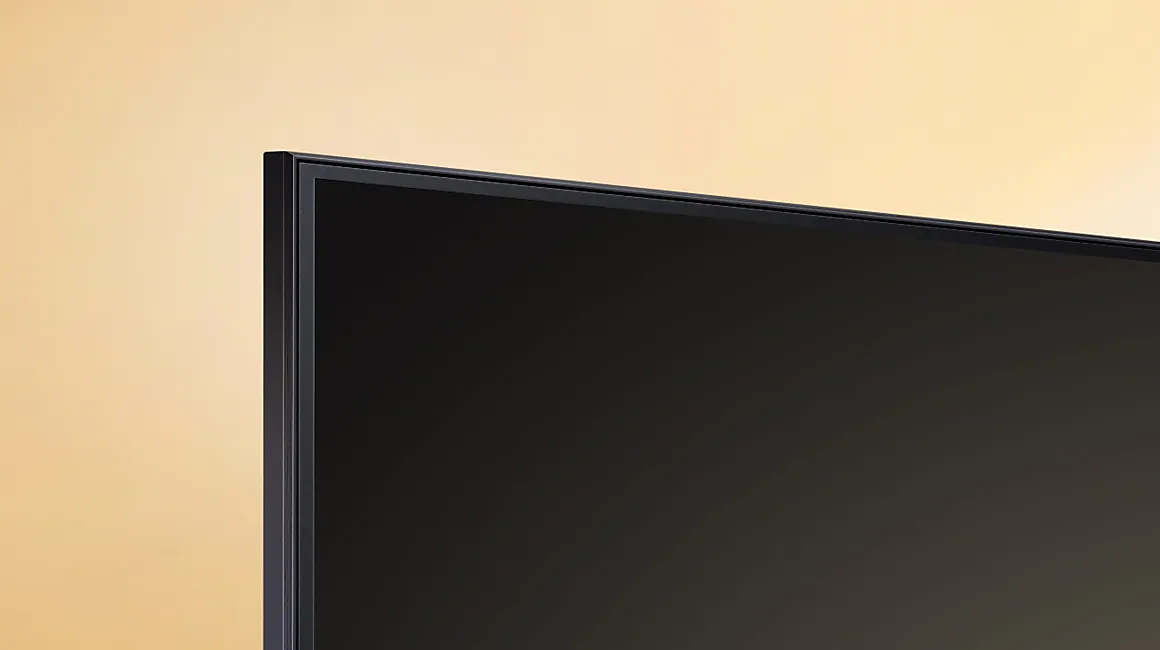
Audio performance
- Stereo sound and 20 watts of power
- Composed and quite distinct audio quality
- Will work with Samsung’s ‘Q Symphony’ soundbars
As is all too predictable with a TV of this price, the AU7100 features a pretty prosaic audio system. Two full-range drivers, powered by a total of 20 watts, isn’t going to blow anyone’s socks off - but in fairness the Samsung is far from the poorest-sounding TV around. It’s a reasonably distinct listen, with the sort of midrange fidelity that makes voices characterful and dialogue easy to follow.
It almost goes without saying that there’s little by way of low-frequency presence here, but even if you decide to find out what those 20 watts are capable of the AU7100 remains a composed listen.
‘Q Symphony Lite’ is available here - so when you decide a new soundbar to accompany your AU7100 is basically essential, check out Samsung’s ‘Q Symphony’ range. These allow the television’s speakers to join in with, rather than be overridden by, the soundbar - and fuller, wider sound should be the result.
Should I buy the Samsung AU7100 Crystal UHD TV?
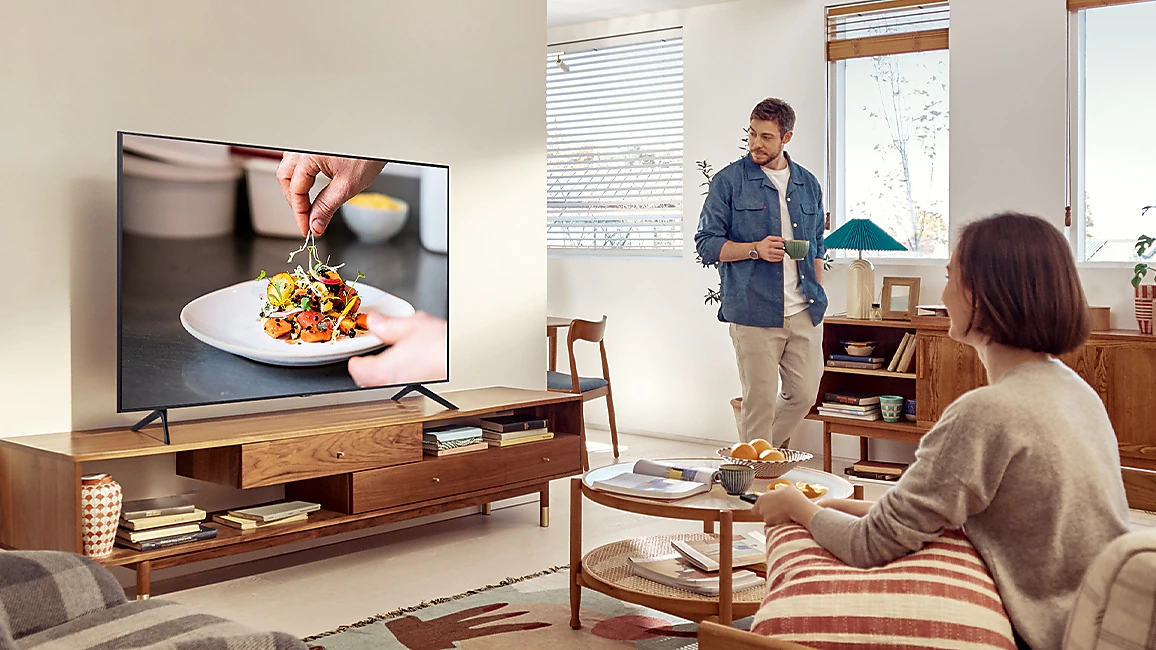
Buy it if...
You like being in control
Voice control? Or the control app? Or the remote control? Or the other remote control? Take your pick, the Samsung AU7100 offers each and every one.
You prefer high-quality content
It’s no massive surprise, but this particular Samsung TV does by far its best work with native 4K stuff, making it great for folks who subscribe to UHD streaming services.
You’re prepared to buy a soundbar
The AU7100 isn’t the worst-sounding TV around, but it could definitely do with some sonic assistance from a second speaker.
Don't buy it if...
You’re expecting across-the-board excellence
Have you seen the price of this TV? You can’t expect the moon and stars on this budget.
You enjoy daytime TV reruns
The Samsung isn’t the most accomplished upscaler around, which means sub-HD TV shows aren't likely to look great on it.
You have a next-gen games console
You need a monitor with more HDMI 2.1 chops than this.
- Looking for more examples of great small-screen TVs? Check out our guide to the best 40-inch TVs
Simon Lucas is a senior editorial professional with deep experience of print/digital publishing and the consumer electronics landscape. Based in Brighton, Simon worked at TechRadar's sister site What HiFi? for a number of years, as both a features editor and a digital editor, before embarking on a career in freelance consultancy, content creation, and journalism for some of the biggest brands and publications in the world.
With enormous expertise in all things home entertainment, Simon reviews everything from turntables to soundbars for TechRadar, and also likes to dip his toes into longform features and buying guides. His bylines include GQ, The Guardian, Hi-Fi+, Metro, The Observer, Pocket Lint, Shortlist, Stuff T3, Tom's Guide, Trusted Reviews, and more.
